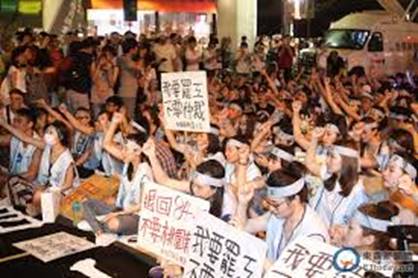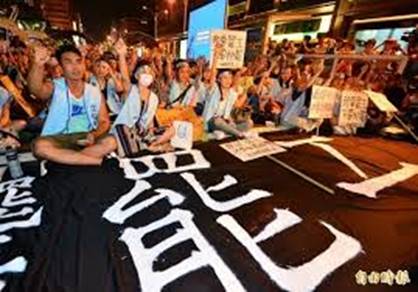
San Diego Taiwanese Cultural Association
http://www.taiwancenter.com/sdtca/index.html
China Airline’s Strike
Some sentiments following the China Airlines flight attendants strike
By Eric Yuju Lee, July 3, 2016
China Airline, one of the largest airline carriers in Taiwan, recently dealt with an unprecedented, first-of-any-kind flight attendants’ strike at the Taoyuan International Airport last week, halting more than 76 flights to Hong Kong, Japan, and other destinations on June 24. 2016
 Here’s basically what went down:
Here’s basically what went down:
On June 21, Taoyuan Flight Attendants Union gathered up the battered crew members to go on strike. The decision received almost unanimous support: of its 2,548 voting members, 2,535 (99%) fervently agreed to voice their discontent.
So what made the flight attendants so angry? Well, numerous things actually.
 It is common knowledge that China Airlines is notorious for overworking its employees and providing inadequate work conditions and pay. Being the stalwart, adamant workers that they are, the flight attendants, though muttering curses underneath their breaths, persevered. However, the Article 84-1, forced onto all China Airline field workers in early May, was the fire that pushed all
It is common knowledge that China Airlines is notorious for overworking its employees and providing inadequate work conditions and pay. Being the stalwart, adamant workers that they are, the flight attendants, though muttering curses underneath their breaths, persevered. However, the Article 84-1, forced onto all China Airline field workers in early May, was the fire that pushed all
crew members past their tipping point. ![]()
Article 84-1 is a new policy that China Airline management sent to its employees to sign. Effective starting on June 1, it has changed the usual check-in location for the flight attendants from Songshan Airport at Taipei City to Taoyun International Airport. This new arrangement meant the flight attendants had to surrender two hours of their rest time per mission to travel from Taipei to Taoyuan. China Airline management also sought to increase monthly hours from 174 to 220, and regarded the 30 minutes time period after landing, time usually reserved for aiding the elderly, the infants, and the disabled or other duties, as rest time. Current labor policies grants flight attendants who worked longer than 12 hours a 24 hour rest. With these policies, many 12-hours-or-longer flights will be reclassified to less-than-12-hours flights, in which the flight attendants will only be granted a 12 hour rest time. Essentially, some 3,500 crew members of China Airlines will be working longer hours while resting for significantly less, all with the same pay. These unreasonable demands, made without consulting any of the flight attendants, finally roused up the flight attendants to fight for their rights.
On June 24, flight attendants, armed with signs baring “fight for our rights!”, “No to Article 84-1!” and other slogans and cries of pent-up ire from years of corporate exploitation, sat in front of Nanjing East Road, a busy traffic artery, from around 6:00 AM and remained there until 9:30 PM, after five hours of negotiation between management from China Airlines and union leaders have concluded at the Ministry of Labor.
According to Deputy Minister of Labor Kuo Kuo-wen, the two sides had reached a preliminary consensus, including an increased pay for overseas stationing from US$3 to US$5, the abandonment of the notion on increasing overtime hours, and a doubling of pay on weekend hours. Union members also called for the sum of pilots’ allowance be on par with that of flight attendants.
The cancelation of flights affected at least 20,000 passengers, and China Airlines suffered a revenue loss of about NT$160 million (US$4.92 million).
So, a couple of things:
This is a monumental event, as it is the first strike by flight attendants in the entirety of Taiwan, and a rare sight of a unified demonstration from the entire workforce within a firm. Hopefully this event will encourage workers of, say, EVA Air, who forbid its workers to unionize, to fight for their rights. China Airline’s subsidiary Mandarin Airlines’ labor union may follow China Airline’s example and will go on strike if negotiations with the airline breaks down on July 7.
The management of China Airlines may or may not comply with all of the union’s demands. As of now, they’ only agreed to ensure staff 123 days of vacation time and pay double their salary when they work on national holidays. According to the press, China Airlines may face a second strike in the coming days as the flight attendant weren’t too thrilled when the chairmen Ho Nuan-hsuan utilized purposeful procrastination, telling the China Airlines employees to wait for two weeks when asked to produce a response.
The attendant’s efforts reflected upon Taiwan’s overworked culture when it comes to its workforce. Taiwan’s workforce averages 2,135 hours at work annually, placing them fourth in the rankings for highest hours worked annually per country; even Japan, a country perceived to be plague with overwork among its citizens, averages to 400 hours less than that of Taiwan. The strike was a wake-up call to workers from other sectors to consider their own positions, and reflect upon their labor rights and other options to improve their working conditions in the future.
(Eric Yuju Lee, 李毓儒,Sophomore at UCSD, son of賴惠玫。Photos were originally published on Liberty Times Net.)